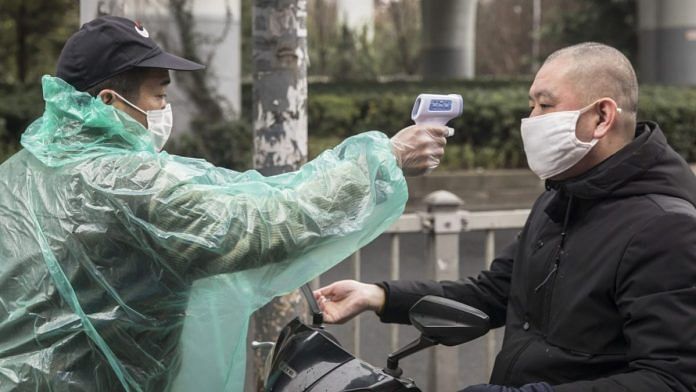
New Delhi: Beijing has recorded a fresh wave of Covid-19 cases in the past few days and this appears to have prompted the local authorities in China’s capital city to declare a “state of emergency”.
Officials have urged all districts, departments and companies to adopt more stringent measures to curb the spread of the virus after six Covid cases, one of which was asymptomatic, were reported in Beijing Saturday.
This brings the total number of confirmed infections recorded since 14 December to 13 in the city. Before this, the city had not seen new cases of Covid-19 for 134 days.
Four of the five symptomatic cases are employees at Jinma Industrial Plant in Beijing’s Shunyi district. The asymptomatic case is a taxi driver from Shunyi.
Global Times and People’s Daily China, both state-affiliated news organisations, reported Sunday that the local authorities have said that Beijing requires “all districts, departments and companies to enter a state of emergency, and adopt a more resolute attitude and stringent measures” to stop the spread of Covid in the city.
#Breaking: #Beijing officials require all districts, departments & companies to enter a state of emergency, adopt a more resolute attitude & stringent measures to stop the spread of #COVID19 in the municipality. pic.twitter.com/c183p0AG7b
— Global Times (@globaltimesnews) December 27, 2020
#Beijing requires all districts, departments and companies to enter a state of emergency, and adopt a more resolute attitude and stringent measures to stop the spread of #COVID19 in the city, local authorities said on Sunday. pic.twitter.com/e8QkISuKyV
— People's Daily, China (@PDChina) December 27, 2020
Experts say new cases could have multiple sources
Authorities are yet to trace how these infections came to Beijing, but the six new cases are locally transmitted and are close contacts of confirmed cases, according to the health authorities.
The Shunyi district launched free testing, with a plan to test 800,000 people on 23 December after the spike in cases.
Beijing mayor Chen Jining also visited Shunyi district Saturday night, urging local officials to thoroughly complete epidemiological investigations and nucleic acid testing.
Since 14 December, Beijing has reported a total of 13 confirmed infections, three in Chaoyang district, one in Xicheng and nine others in Shunyi. At least four infections have some links to cold-chain products — infections spread either through the selling or purchasing of frozen products.
Some experts hinted there may be multiple sources of infections, while Feng Zijian, deputy director at the Chinese Center for Disease Control and Prevention, said it must have been imported from overseas.
Feng added that the city’s current measures were effective and it cannot fully avoid imported cases from causing locally-transmitted infections.
While several countries across the world are still struggling with the pandemic, China has largely contained the virus with sporadic new cases. The Chinese economy was also one of the first to successfully bounce back during the pandemic after strict measures in the country helped arrest the spread of the disease.
Subscribe to our channels on YouTube & Telegram
Why news media is in crisis & How you can fix it
India needs free, fair, non-hyphenated and questioning journalism even more as it faces multiple crises.
But the news media is in a crisis of its own. There have been brutal layoffs and pay-cuts. The best of journalism is shrinking, yielding to crude prime-time spectacle.
ThePrint has the finest young reporters, columnists and editors working for it. Sustaining journalism of this quality needs smart and thinking people like you to pay for it. Whether you live in India or overseas, you can do it here.